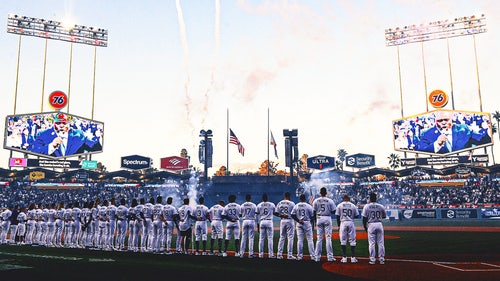
Miller says players accountable for pay, not CEOs
Marvin Miller says high salaries of Major League Baseball players are more justifiable than the huge income of Wall Street and corporate CEOs.
Appearing at the New York University School of Law on Tuesday night to discuss the 40th anniversary of the first baseball strike and the rise of the players' association, the 95-year-old former union head spoke for 68 minutes and delivered a blistering criticism of corporate pay. He also said collusion by owners in the mid-1980s was worse than the Black Sox scandal in 1919 and claimed the first baseball commissioner, Kenesaw Mountain Landis, may have been a member of the Klu Klux Klan.
''Let's take chief executive officers of important corporations, or the stock exchange or Wall Street firms,'' he said. ''The typical way that compensation is set is for the board of directors, most of whom if not all of whom have been appointed directly by the CEO, decide what the CEO's salary should be, or they have a committee, a compensation committee composed of board members.
''The first thing about that is that here you have a direct conflict of interest, because sitting on a board are executives of other corporations, and what they are doing is adding ammunition to their own quest for higher salaries. And it's such an obvious conflict of interest that it's awful. Of course they're going to vote for higher salaries.''
He said the directors are at fault because ''they don't pay for it. It's paid for by stockholders, who have had no voice on what the salaries and compensation and perks of the chief executive should be.''
He then compared the system to baseball, where the average salary on opening day this year was $3.4 million and the Yankees' Alex Rodriguez topped players at $30 million.
''There always has been and is a rule that no contract of a player is valid unless it is signed by the franchise owner or somebody designated by the franchise owner in his place,'' Miller said. ''In other words, no salary is put on paper and becomes valid until the man who is going to pay for it, the owner of the franchise, has signed the contract. A better check and balance you can't find anywhere.''
Asked afterward what should be done to reform corporate pay, Miller said ''I really think the more democratic thing is to require the approval of a majority of the stockholders.''
''It's their money,'' he said. ''It should be part of the discussion to have elected representatives. And then the entire body of them should be consulted for their approval.''
Miller headed the players' association from 1966-81, and the average salary rose from $19,000 to $185,000 under his tenure.
He helped win the landmark free agency arbitration decision in 1975 that changed sports.
MLB revenue has increased 142-fold from $50 million in 1967 to $7.1 billion last year. He said free agency and resulting fan interest have contributed to the rise.
''I never before saw such a win-win situation my life, where everybody involved in Major League Baseball, both sides of the equation, still continue to set records in terms of revenue and profits and salaries and benefits,'' he said. ''You would think that it was impossible to do that. But it is possible, and it is an amazing story how under those circumstances, there can be both management and labor really winning.''
Sitting alongside Miller on the panel was Michael Weiner, who took over as union head three years ago, and Dick Moss, the general counsel who helped win the landmark Andy Messersmith-Dave McNally case that gained free agency.
Don Fehr, who followed Miller as union head and preceded Weiner, sat in the front row. Eight-time All-Star Ted Simmons, who nearly became the test case for free agency in 1972, also was in the audience of about 100.
Miller, who turned 95 on April 14, needed a cane to walk to the front of the room. He was especially feisty in discussing the first baseball strike, over pension benefits. It led to the cancellation of 86 games and was the first of eight work stoppages through 1995, including a 7 1/2-month strike that wiped out the 1994 World Series.
He said not enough attention has been focused on three decisions by arbitrators that found owners conspired against signing free agents following the 1985, 1986 and 1987 seasons. Management settled the cases in 1990 for $280 million.
''They put the Black Sox scandal into infancy,'' Miller said. ''This was really a scandal of major proportion and to this day it hasn't been treated as such or written about or really researched at any time. It's kind of shocking when you think about it.''
He implied Landis was unfair to have banned eight players for life in the Black Sox case, especially since the criminal cases against them were thrown out.
Of Landis, he said ''later it was felt (he) was clearly a member of the Ku Klux Klan.'' Jackie Robinson didn't break baseball's color barrier until 1947, 2 1/2 years after Landis left baseball.
There has been no evidence that Landis was a Klan member.
''I don't know that he wasn't,'' Miller said after his speech. ''The rumors were that he was.''










